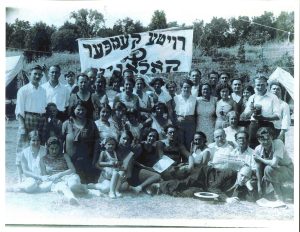 As an officer in the Israel Defence Forces’ Military Advocate General’s Corps for 23 years, I held various noteworthy positions, but one of the most significant experiences I had during this period had nothing to do with my legal career.
As an officer in the Israel Defence Forces’ Military Advocate General’s Corps for 23 years, I held various noteworthy positions, but one of the most significant experiences I had during this period had nothing to do with my legal career.
In December 2006, a few months before ending active duty in the military, I was chosen to be among a group of 180 IDF officers who travelled to Poland on a six-day mission appropriately named Edim Be’Madim (Witnesses in Uniform).
For some years now, the IDF has been sending several such groups to Poland and other parts of eastern Europe every year, and while similar important projects exist, such as the March of the Living, there is something unique about Edim Be’Madim.
The IDF takes these missions seriously. Each is commanded by no less than a brigadier general and is joined by family members of eight fallen IDF soldiers, who become integral members of the group. In the months before our journey, we took part in extensive preparations. There were several day-long sessions at Yad Vashem, and another at Ben Gurion College in Kibbutz Sde Boker, reflecting, among other things, on whether the Jews of Palestine did enough for those in Europe during the war years and how Israelis treated survivors when they arrived in the nascent state. Missing any required training meant being scratched from the mission.
Joined by an inspiring survivor of Auschwitz, we flew in uniform into Krakow’s airport on an Israeli Air Force jet and spent the entire trip in that attire (excluding Shabbat in Warsaw, when we were allowed civvies). We proudly displayed tags with the Israeli flag on our arms wherever we went.
It was a rigorous journey, both physically and emotionally. Each day began at 6 a.m. and ended near midnight. We visited Krakow, Lublin and Warsaw, Auschwitz-Birkenau, Majdanek and Treblinka, and many more Shoah-related sites.
Several of the scheduled events made this (and other similar IDF missions) exceptional. We held five full military ceremonies at different sites. Singing Hatikvah in IDF uniform, while saluting our flag, on the ruins of the crematoria and gas chambers in Birkenau is certainly a posthumous victory.
At the end of one particularly long and emotionally trying day, we held a moving ceremony in memory of each of the fallen IDF soldiers whose family members had joined us. Several of the latter were themselves children of Holocaust survivors who had buried their own children, killed defending Israel. There was not a dry eye among all the hardened officers on the mission.
Early the next morning, we travelled to Auschwitz. In one of the most emotional moments of the trip for me, we marched in full military parade into that horrific place, with our Holocaust survivor leading the way, followed by several officers bearing Israel’s flag and IDF banners. Proudly marching through the “Arbeit Macht Frei” gate, I was once again brought to tears by the symbolism of our act.
On the last day of the mission, we visited the village of Tykocin, a shtetl whose population was once more than half Jewish. In August 1941, the Germans rounded up all the Jews and marched them for many hours to a clearing in nearby Lopochova Forest. They lined them up before three huge, freshly dug pits, and, for a day-and-a-half, they systematically machine-gunned all 2,100 people. We marched in silence into that clearing and surrounded the mass graves, lighting memorial candles that we had brought with us from Israel. The silence was deafening.
Returning to Israel that same night on an air force jet, I couldn’t wait to land. While this country has many problems and is far from ideal, it is home. Alighting from the plane, I was never prouder to be an officer in the IDF, an army attuned to its nation’s past and understanding its role and responsibility for ensuring that no further catastrophes befall us.
The mission didn’t end with our return. It took quite some time to recover. My thoughts often returning to the sights and sounds we had encountered. A month or so after coming back, and as part of the Edim Be’Madim follow-up, our group met again to reflect on our common experiences and discuss how they’d shape our future behaviour – as citizens, commanders, parents or just plain human beings.
The journey was seminal and has yet to be concluded. The attempt to comprehend the utterly incomprehensible will continue.






